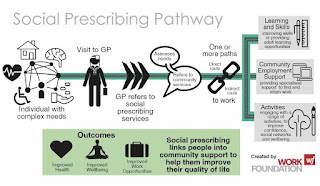How "Social Prescribing" could lead to Universal Mental Health Care
Here in Canada we have universal health-care which isn't without it's challenges but most Canadians agree that we wouldn't want it either way. One detraction from our system though, is that often, significant medical procedures involve month long waiting lists. Some argue for a two-tiered system which would allow those who are financially capable to access care immediately. While this appears to be (and I believe actually is) an unfair advantage to the wealthy, some would argue that this lessens the load on the public system, reducing wait times overall. Win-win... supposedly.
I know it's apples and oranges but we only need to look to our mental health care system, which is two-tiered, to evaluate how this approach might play out. It is my experience, that since there is such a large need for mental health related services, the public system is completely overloaded, even when a considerable portion of the population is accessing private counselling using their extended health care plans and/or paying out of pocket.
In an ideal world I would advocate for universal mental health care but logistically it would be a nightmare. I'm not sure how it could be rolled out. Would it mean free counselling for everyone? How many sessions? Would treatment only be covered if it were with psychologists and clinical social workers or would we train more front line workers? Would it include coverage for pharmaceuticals? What about modalities of therapy that are less researched? Would we as mental health professionals only be allowed to provide Cognitive Behavioural and Solution Focussed Therapies? Too many holes in an otherwise good idea.
Right now, in order to keep up with demand, we have our family doctors screening people for mental health disorders and using, more times than not, the medical model of intervention which almost inevitably includes pharmaceuticals. Now I need to be clear that I am not saying that medication doesn't have its place in mental health treatment but I am concerned about the long term treatment plan. If you are on antidepressants do you and your doctors have a plan as to how you are you going to make behavioural, dietary, and psychological changes so that you don't have to be on them for the rest of your life? And what about people who don't have health plans that cover the cost of their medications? The medical model is helping but it is increasingly more expensive to us whether that's through the direct cost of the medications or the overall cost to our healthcare and insurance systems. Not to mention the immeasurable and invaluable cost of unnecessary human suffering.
What if there was another option? An option that might actually be more effective AND be significantly less expensive than the medical model. What if there was a treatment option that was so inexpensive that it could actually be prescribed to and carried out for everyone who needs it?
There is an approach called "social prescribing" that could be just the ticket for a province or country looking to improve overall wellness for a fraction of the cost. For an in-depth break down of what social prescribing is go here. But the gist is that within this approach, GPs and mental health care professionals would be allowed to prescribe non-clinical treatments for mental health concerns like anxiety or depression (caveat: a referral to this program may not always replace conventional treatment but supplement it. I'm not suggesting that gardening is going to replace antidepressants and psychotherapy across the board). Here is a quote from the afore-linked article:
"Recognizing that people’s health is determined primarily by a range of social, economic and environmental factors, social prescribing seeks to address people’s needs in a holistic way. It also aims to support individuals to take greater control of their own health."
So these "community referrals" might include a prescription of group gardening instead of or as well as an anti-depressant. It might be a swimming club, a cooking class, a sport, or a hobby or class. Now, it's not just a blank invitation to go swimming, but an organized and concerted effort to construct a socially enriched endeavour that would provide meaningful socialization and engaging work or play. A mental health professional will still be involved in the overseeing of these activities in some form or another to help facilitate the therapeutic outcomes.
And what are these outcomes you ask? An improved connection with other people, a chance to reconnect with nature, the opportunity to reconnect with the part of one's self that craves meaning. All factors that make it difficult for a human being to be depressed or anxious. Factors that medication or even psychotherapy have a hard time providing. Factors that could potentially be offered universally.
And what are these outcomes you ask? An improved connection with other people, a chance to reconnect with nature, the opportunity to reconnect with the part of one's self that craves meaning. All factors that make it difficult for a human being to be depressed or anxious. Factors that medication or even psychotherapy have a hard time providing. Factors that could potentially be offered universally.




Comments
Post a Comment